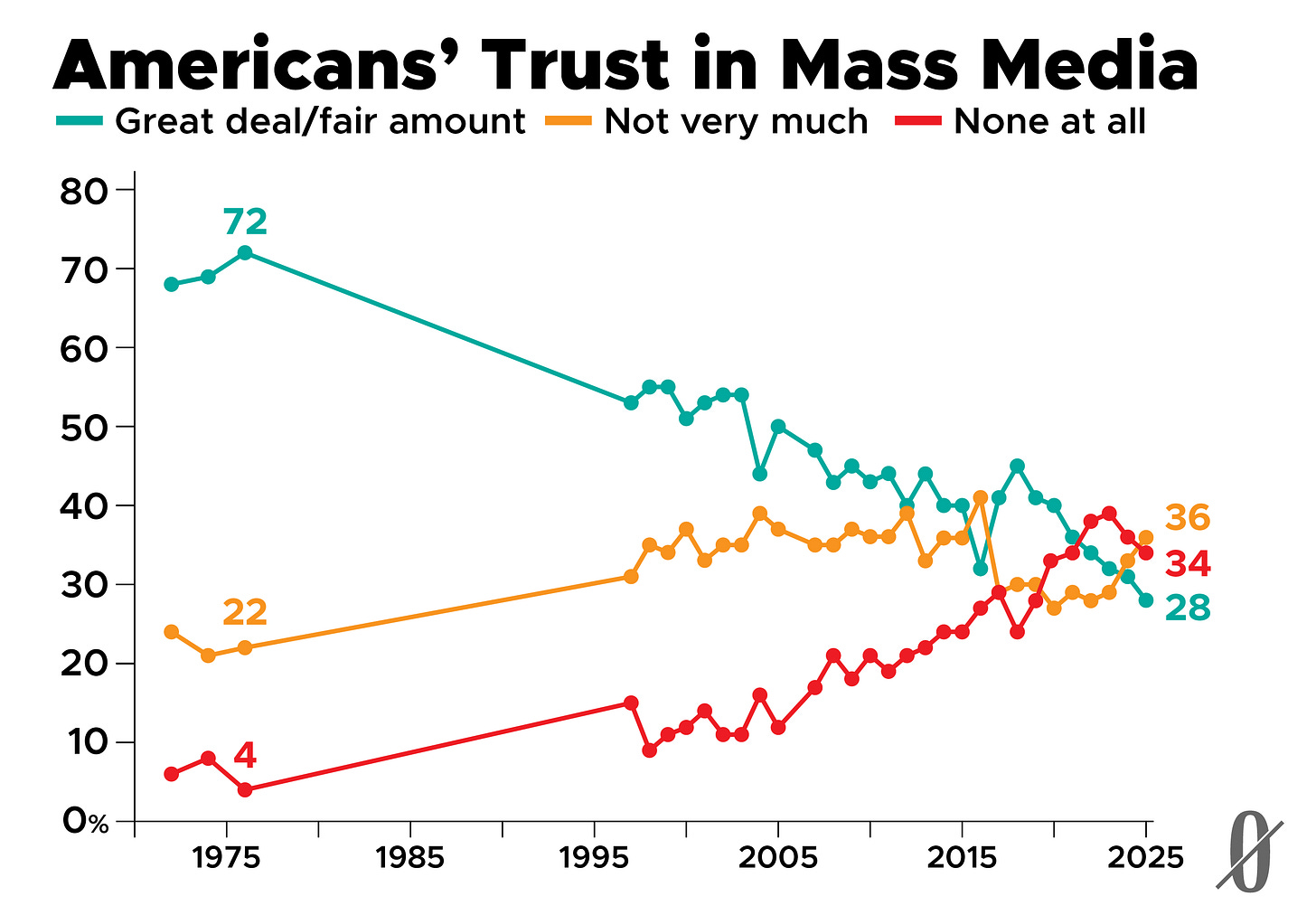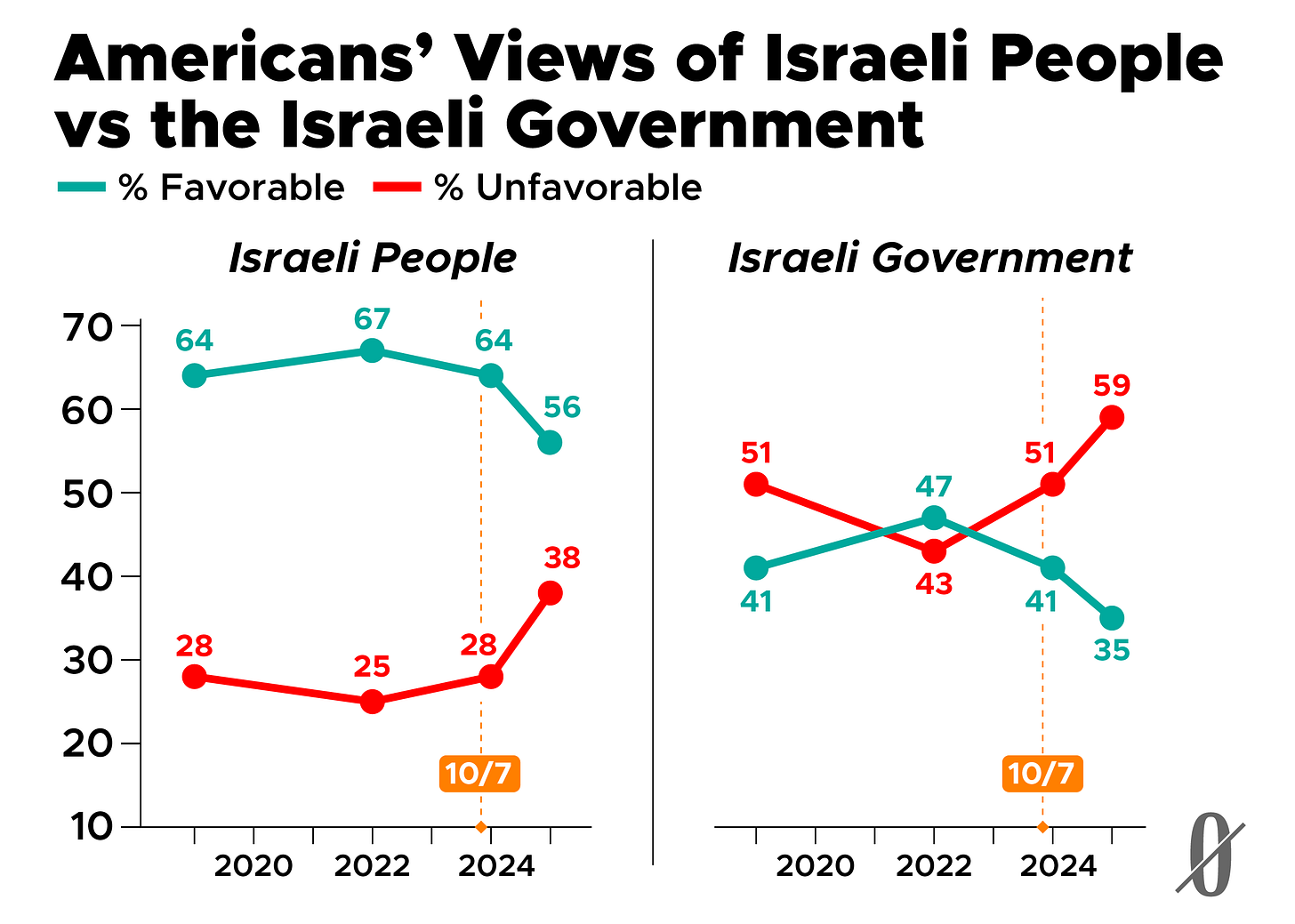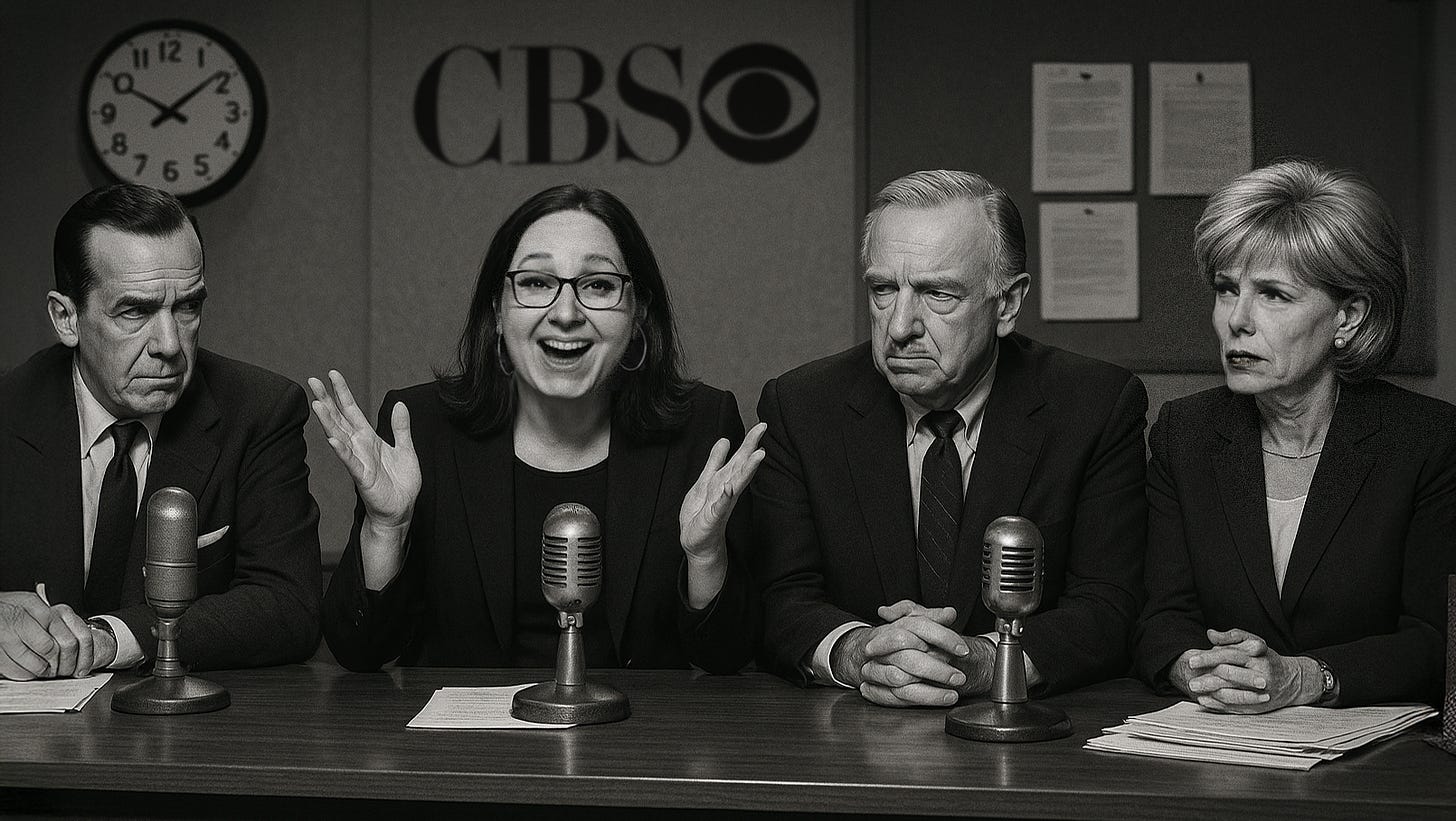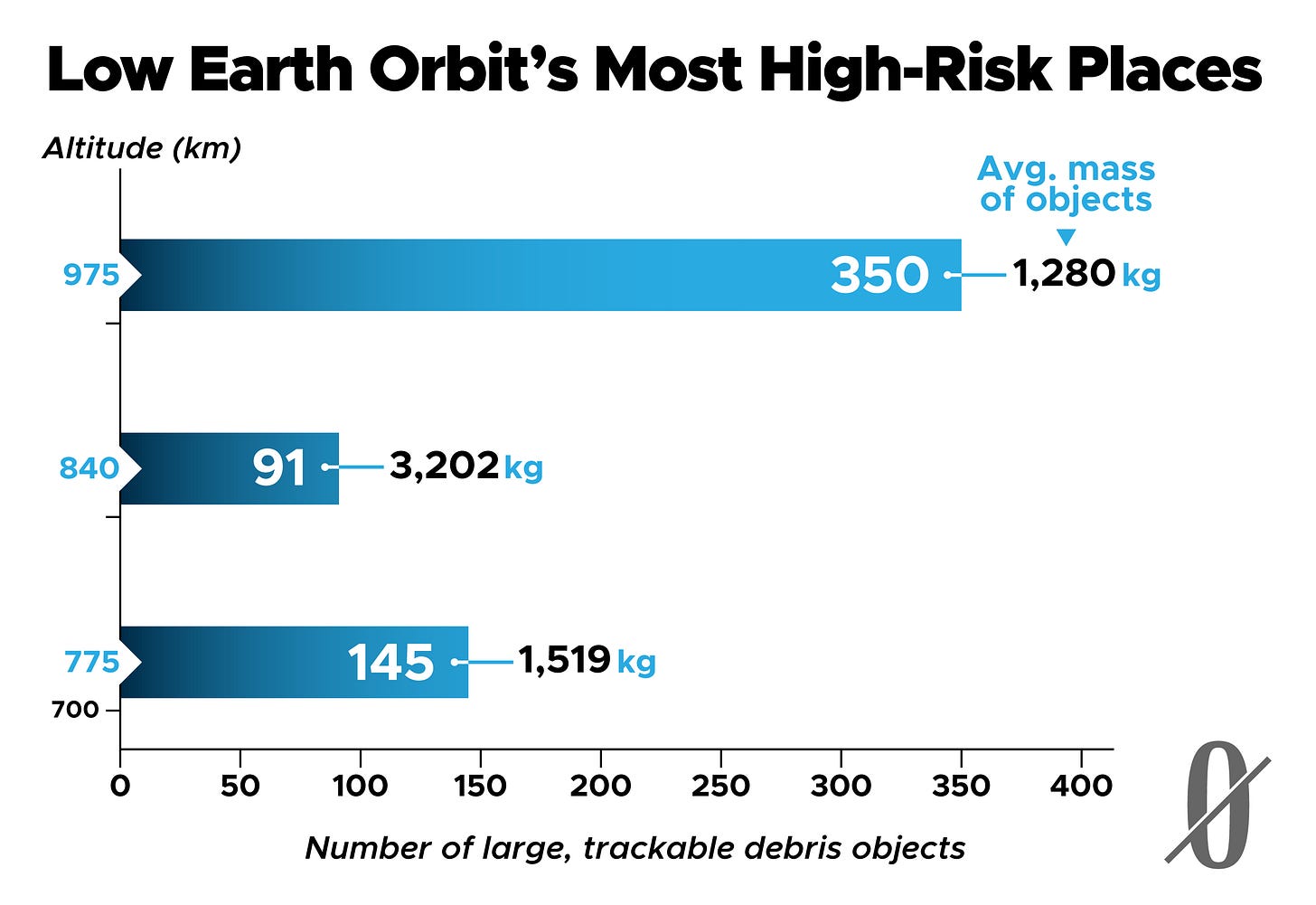Bari Weiss, the New CBS News, and Gaza
Plus: Space junk tipping point; East-West AI fusion; NZN Discord server! and more!
Note: This week’s Earthling is slightly shorter than average, but I have an excuse: A week ago I finally turned in the last chunk of manuscript for my book on AI, and then my editor set a new world record for feedback rapidity, so the ball is back in my court, and if I don’t get all revisions in by early next week there could be unwelcome consequences (like the book coming out much later than I’d like rather than just later than I’d like). So I’m cranking away on that, trying to meet a drop-dead deadline (the worst kind) that’s a few days away.
But there’s good news: We’ve now launched the NonZero Discord server, so if you get to the bottom of this short-ish newsletter and hunger for more, you can expend some of your restless energy leaving comments on Discord or conversing with people who have already done that.
And there’s even better news: The Gaza War looks as if it may finally end. And, though the deal could still fall apart, there’s more reason to hope for enduring peace than there’s been since October 7, 2023. Below I offer my answers to some basic questions about the Gaza deal, and then segue into some related thoughts about Bari Weiss, newly appointed editor-in- chief of CBS News.
1. Will the peace hold? Skepticism is the natural reaction of any veteran Middle East watcher. And also of any veteran watcher of Bibi Netanyahu and Donald Trump, two men who are globally famous for reneging on deals. After all, once Hamas turns over the remaining Israeli hostages, it will have little leverage. Still…
There are reasons for optimism: (1) Trump now sees part of his legacy (and all of his long-fantasized-about Nobel Peace Prize) as linked to an enduring peace; (2) An international “stabilization force” that will include soldiers from Egypt, Qatar, and Turkey is expected to materialize in Gaza. (Some US soldiers have already arrived in Israel, though it’s not clear if they’ll deploy in Gaza and be part of that force.) The presence of such a force would make the renewal of hostilities by Netanyahu, a veteran renewer of hostilities, a lot more awkward than it would otherwise be.
2. Could this lead to a resolution of the broader Israel-Palestine conflict? Unlikely. Unless this success expands Trump’s peacemaking ambitions (and unless he sets a new personal record for attention-span duration), the displacement of Palestinians in the West Bank will continue via settler violence that has the tacit approval and sometimes active support of the Israeli military. And there’s no end in sight to the (illegal, under the Third Geneva Convention, which Israel signed) proliferation of Israeli settlements that has gone on for nearly six decades. And Israeli soldiers will continue to occupy more than half of Gaza. Still, if the Gaza deal holds, it will prevent, for the time being at least, the wholesale ethnic cleansing of Gaza, which was the expressed goal of some people in the Netanyahu government and the unexpressed goal of others. And that’s very important—though of course, when things have gotten so bad that you’re deeply grateful for an epic war crime being put on pause, things have gotten pretty bad.
3. What does any of this have to do with Bari Weiss? You may ask why, atop these reflections on Gaza, sits an image of (or at least a deepfake of) Bari Weiss, who this week was named editor-in-chief of CBS News, alongside deepfakes of CBS News eminences past and present: Edward R. Murrow, Walter Cronkite, and Leslie Stahl. Part of the answer is that we were planning to run something on the Bari Weiss/CBS thing before the Gaza news broke, and when I saw the picture that NZN Deepfake Czar Clark McGillis had cooked up for that occasion, I couldn’t resist including it. But another part of the answer is that there is a kind of connection between Bari Weiss and the Gaza story. Here’s the segue:
4. Why didn’t a peace deal like this happen earlier? Gershon Baskin, an Israeli who has long been involved in negotiations with Palestinians and played a role in this episode of them, wrote yesterday that “this deal could have been done a long time ago.” A year ago, Egyptian officials told Baskin that, “Hamas was ready for a deal to release all of the hostages, not to govern Gaza any longer, and to end the war. But Israel was not ready.” And President Biden wasn’t inclined to decisively pressure Israel. Qatari officials told Baskin that “without the American adoption of the plan, nothing could be done, because the obstacle was Israel, not Hamas.” Baskin says he met with some members of a US negotiating team last October and “they were as frustrated as I was in their inability to convince Biden and Biden’s people to look seriously at the deal on the table.”
There are lots of reasons American presidents are reluctant to pressure Israeli leaders to do things. (Apparently it took Israel’s recent missile strike on Qatar, a US ally that houses a US military base, for Trump to get so fed up with Netanyahu that he finally started pushing him toward a deal.) But certainly one of these reasons has been an American political atmosphere that strongly incentivizes presidents to give unconditional support to Israel. And one thing that has helped sustain this atmosphere is a kind of speech code that gives any sharp critic of Israel reason to worry about being labeled anti-Semitic. Which leads to:
5. “Why is everyone so mean to Bari Weiss?” That was the title of a piece I wrote in NZN five years ago about Weiss’s role in articulating and enforcing the speech code. For example: Weiss has said that opposition to Zionism constitutes anti-Semitism. This of course makes no sense; many Jews oppose Zionism, and some opponents of Zionism oppose the idea of any ethnically-based or religiously-based state, including Islamist states such as Iran or Saudi Arabia. But equating anti-Zionism with anti-Semitism does send the message that Americans should be very, very careful about how they couch any criticism of Israel. And this chilling effect has helped limit the amount of pressure American presidents feel to play hardball with Israel.
During the last two years of routine American reluctance to use even a fraction of its massive leverage with Israel, 67,000 Palestinians—1 in 31 Gazans—have been killed, most of them civilians, and God knows how many have been maimed. The killing continued long past the time when vengeance had been achieved for the killing of 1,200 Israelis (including 800 civilians), and long past the time when “deterrence was restored,” and long past the time when the war was even benefiting Israel’s long-term security. And the hundreds of thousands of friends and relatives of these dead and maimed Palestinians will rightly blame not just Israel but America, which provided the weapons that did the killing and maiming (which doesn’t mean they wouldn’t also be right to blame Hamas). And the consequences of that will be with us for a long time.
CBS News has in the past done good critical reporting on Israel—by, for example, the late Bob Simon (who was Jewish). More than a decade ago I met Simon, and he told me about the epic blowback he’d gotten from various pro-Israel actors for a report he’d done on the situation in the West Bank—blowback that reached high-ranking executives at CBS. This is the kind of blowback that Bari Weiss has supported, and sometimes been part of, for decades. As an undergraduate at Columbia she co-founded a group with the Orwellian name “Columbians for Academic Freedom,” which aimed to get the administration to discipline professors who were harshly critical of Israel (on grounds, of course, that they were anti-Semitic, by her lights, or in some other way made pro-Israel Jewish students feel uncomfortable).
So don’t expect to see much reporting that’s critical of Israel on the CBS News of the future. And don’t expect to see retractions of any erroneous Israel-related reporting. Below is an excerpt of my discussion, a year ago, with regular podcast partner Paul Bloom about a story in Weiss’s Free Press that egregiously mischaracterized an alleged anti-Semitic attack on Yale’s campus. Notwithstanding clear video evidence of the story’s inaccuracy, the article still stands on the Free Press site, without correction or amendment (aside from a slightly and wisely toned down headline).
Note: Paid NZN subscribers can now get a 50 percent discount on a one-year subscription to Paul’s excellent Substack newsletter, Small Potatoes. The discount coupon is at the bottom of this newsletter, below the paywall. And here’s my latest conversation with Paul, posted today.
—RW
Regular NZN readers may be familiar with the Kessler syndrome: a hypothetical disaster scenario in which near-Earth space, increasingly crowded with satellites and stray debris, becomes the sight of a chain reaction of collisions that wipes out much satellite infrastructure and renders much of Earth’s orbit unusable. As writer Margo Anderson lays out in IEEE Spectrum, that scenario is getting less hypothetical. A number of researchers now say that certain orbital altitudes—such as 775 km, 840 km, and 975 km—have become so full of satellites and space junk that runaway chain reactions are a real risk. No existing international agreement is up to the challenge of dealing with such a problem. Harvard-Smithsonian Center astrophysicist Jonathan McDowell says that avoiding catastrophe will require “internationally coordinated agreements on who gets what orbit and how many satellites you can have in that orbit.”
Meanwhile: Looks like outer space isn’t the only place where wayward space objects are a problem. Starlink satellites are now falling to Earth at a clip of one to two per day. These reentries are mostly harmless; the satellites are guided toward an ocean landing after their five-year lifespan. Even so, the FAA warns that by 2035, given current satellite population growth rates, falling space objects could every two years, on average, spell the end of some unlucky Earthling.
Artificial intelligence is giving a kind of validation to traditional Chinese medicine, according to a study covered in Scientific American. Centuries-old Chinese diagnostic techniques have focused on the tongue as an indicator of illness. In the study, scientists used machine learning to test the diagnostic value of aspects of the tongue these techniques focus on—color, shape, and coating. After training six AI systems on thousands of tongue images and the associated diagnoses, they found that the best-performing model, faced with new cases, could predict the diagnoses made by western doctors (such as anemia, diabetes and COVID) with 96.7 percent accuracy. Researchers hope such tools can one day complement traditional western clinical techniques and, in a sense, converge with them: Just say “ahhhh.”
As Bari Weiss takes the helm at CBS News, she would seem to have her work cut out for her on two fronts:


Finally: Don’t forget to check out the aforementioned Discord server. When we asked in the most recent Earthling if readers would sign up for a Discord, a few people said they would—but scores of people actually did sign up after we shared the link in Tuesday’s podcast’s show notes. If you want to mingle with other inhabitants of NonZero world (and btw, I see that real-life meetups are already being discussed in the Discord) click here to join.
And here’s that discount coupon for Paul Bloom’s newsletter:





